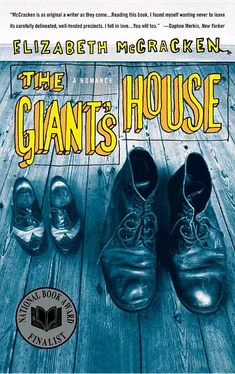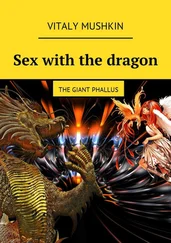Now James was in a hospital in Boston. The doctors said they were surprised it hadn’t happened sooner — growing at such a rate guaranteed weakened bones, and almost any bone in his body was a candidate for breakage. Especially his legs, which grew faster than any other part of him.
“Oh,” I said. “I’m so sorry. How is Mrs. Sweatt?”
“She’s dead,” Caroline said wonderingly — and she made it sound as if she were (like Mrs. Sweatt) merely repeating something I had said, as if I were the one with sudden tragic news.
“Good heavens,” I said. “I’m so sorry. Poor Mrs. Sweatt.”
“We wanted you to know—”
“—I appreciate it—”
“—we wanted you to know that we’re not telling James. That she’s dead. Not right off.”
I looked at her. “How can you not?”
“We’ll tell him when the excitement is over.”
“It’s not going to be over,” I said. “His mother is dead.” The Stricklands’ extreme secrecy struck me as craven; they were as stingy with bad news as some people were with good.
“We’ve thought this over,” said Caroline. “We really have, Peggy. James was trying to save his mother, if only for one night. How can we tell him he didn’t?”
I didn’t know.
“So maybe when he’s a little better. When he’s up and around. Just not today, and not tomorrow.”
“Okay,” I said. “I understand.”
“You’ll have to excuse me,” Caroline said.
“Yes.” I waited for her to get up. Instead, her eyes filled, and then tears rolled down her face. No other evidence of grief, just slow tears and an embarrassed smile. Then she set her wet turned-up hands on her considerable stomach, as if she intended to save her tears for some future use.
“We’ll miss her,” she said. Then she patted her face with the back of her hands.
“What will happen to James?” I asked.
“Oh, he’ll stay with us,” said Caroline. “He’ll always stay with us.”
“I know that,” I said. “What did the doctors say?”
“They don’t know. Get taller still, I guess. Bound to stop eventually.”
“The doctors said that?”
“No. The doctors say he’s healthy. They’ve said that all his life. For now, he’s still growing.” Caroline shook her head at this, as if his growth were some teenage notion he’d got ahold of, motorcycle riding or a wild girl. “That’s all they’ll say.”
“What have you told him? About his mother, I mean.”
“The truth,” she said. “Just not all the way. She’s tired, she’s gone for a rest. James likes you,” she said, and even given the circumstances, that trilled my heart. “Just be nice to him. I mean, I know you are.”
“I am,” I said. “I will.” I went to put my hand over hers, but couldn’t. “You’ll need help,” I told her. “Especially now that you don’t have—”
“Yes. Well.” She played with the fringe of the throw. “I just never saw it coming.”
“Never saw what?”
“Mrs. Sweatt’s problems,” she said. “She seemed so happy to me. She had James, she had plenty to do. You’d never have known she was the least bit sad.”
Not sad? To me she seemed the saddest person in the world, a woman completely perplexed by her life and its trappings. Being myself a sad person, I recognized that much. My own sadness isn’t something I admit to people. If someone asked, yes, I think I might. If someone noticed and inquired, I would explain — I think I would explain — that I am a fundamentally sad person, a fundamentally unlovable person, a person who spends her life longing for a number of things she cannot bring herself to name or define. Some people can. Some people are small reference works of their own obsessions and desires, constantly cross-indexed and brimming with information. They do not wait to be consulted, they just supply.
Others of us — and I include Mrs. Sweatt — do not. We are the truly sad, I think; just as in some religions, those who pray alone, who do penance and charity work alone, are the truly pious. Like the truly pious, we can recognize one another. Mrs. Sweatt and I were lonely, independent mourners.
But she was beautiful, and I was not. This is a vital difference. She grows more beautiful in my memory, looks more like James. True enough she is small and curvy and he tall and thin, but they have the same hair — though hers is blonder, by the grace of nature or science — the same upturned nose, the same pink pillowy lips. Young faces, much more alike in my memory than they ever were when alive.
They are both dead now, and I can make them look however I want.
She was beautiful. That is a fact. So beautiful Oscar could take her face and turn her into a superheroine, into Rocket Bride, and think he was only drawing a beautiful woman , no one in particular. He gave Mrs. Sweatt, abandoned wife, powers that might have made her life bearable. Maybe not. Maybe they’d have been a burden, a constant reminder. Did Rocket Bride want simply to leave, her gown a netted heap on the ground? Say, forget it, I’m taking my honeymoon solo? Crime can take care of itself; injustice will have to continue unabated without my help. I will drink blue drinks and dance alone. I will love myself.
But you cannot fly away from people who have flown away from you; you cannot fly into your own arms. Mrs. Sweatt’s husband had left her, James himself was growing away and away. Once you have been left you are always left; you cannot leave your leaving.
Mrs. Sweatt did not lift into the air like Rocket Bride, even though I liked to imagine she did. She died in the hospital, or on the way there, and that was only the end of the story. All night long she’d been dying on that gaudy flowered sofa, where she napped, where she waited for James to come home from school, where she spent her solitary nights. That sofa already missed the dip of her back, the way her legs were too short for her body. The way she hid those short legs with her full, high-waisted skirts.
I see her rocketing into the sky, not in a wedding dress but in one of those skirts, so big it blossoms up and haloes her. Not defiant, as Oscar had drawn her, but pensive, full of plans.
She is looking for an aerial view.
There she goes, into the thin air that wraps around the heads of statues, not the sludge near the ground that we usual people must make do with. Everyone stands up as she leaves, though she’s flying away from us and can’t see. She just knows. Do we miss her yet? Our heads are thrown back, mouths wide as bowls, ready for her to drop something into them. Maybe she’ll write something in the sky with her vapor; maybe the vapor will use her up entirely. She levels off, inclines her head toward the ground. She’s so far away she can see everything and everyone, she’s made them all neighbors this way, her long-gone husband and the President of the United States and Orson Welles and she can’t tell the difference between the people and the buildings, the Washington Monument is just a stop sign from this altitude. It’s like she’s turned everyone on earth into tacks on a child’s map, each marking our own place. That far up she can see the slow curve of the earth. She sweeps closer, so she can see what we’re wearing, the color in our cheeks. James is here, in this crowd of people watching her, and she can barnstorm him, run a hand over his head without disturbing anyone else. We don’t even feel the breeze of her skirt as it flutters by, as she reaches down and touches his hair and his chin. Even now she straightens his collar, not on tiptoes this time. Only she can do this for him.
There’s James below. Really, he doesn’t look so tall, so unwieldy. He looks handsome and manageable. An aerial view is not the whole story, it’s a gloss, an abstract, a beautiful, beautiful summary.
Читать дальше












